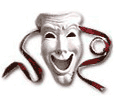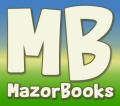|
||||||||||||||
|
MazorGuide Home > Culture > Humor > About Jewish Humor - III
Laugh and the
World Laughs With You
Laughter is an indispensable and a wonder-working catharsis for
pain. It diminishes the magnitude of one's trials and tribulations,
it elevates man from victim to conqueror, from a weakling to one
possessing strength and stature. Sholom Aleichem's characters,
though all destitute and impoverished found merriment in the
mastering and taming of fear. One of his most famous and celebrated
personalities is "Motl, son of Peysi the cantor." Motl's family was
forced due to "financial" difficulties to sell their humble abode
and all its contents. When Motl's sick, dying father hears his
wife’s cries, he calls out from the next room, wanting to know what
the commotion was about. "'Nothing' mother answers, wiping her red
eyes, and the way her lower lip and her whole face quiver you'd have
to be made of stone not to burst out laughing."
Sholom Aleichem, like others, was
distressed and terribly shaken by the pogroms afflicted on his
brethren in czarist Russia. He expresses the terror and dread in a
humorous manner with Motl as his mouthpiece. Motl says, "At first
when I heard people talking about 'a pogrom' I was all ears. Now
when I hear the word 'pogrom,' I run! I prefer happy stories."
"Better to laugh than to cry," says an
old Yiddish proverb, and another famous quotation circulating in the
Jewish community concurs: "Tears cleanse the heart, but laughter
makes it lighter."
In the United States, where the majority
of the world's Jewry resides, the trend continues. Approximately 70
percent of the America's working comedians are Jewish, while Jews
account for less than 2.5 percent of the country's total population.
The explanations given above as to the reasons for this occurrence,
and for the function of Jewish humor in every day Jewish life are
not entirely relevant. Though anti-Semitism exists, oppression does
not. A Jew is no more in danger walking down a New York street than
anyone else. What then is the major drive that nourishes this
phenomenon? A story is told of an old woman who approached a blonde,
blue-eyed man.
"Excuse me, Mister," she began
tentatively, "but you're a Jewish boy?"
He regarded her disdainfully for
a moment and then replied,"No, madam, I am not." Still
uncertain she repeated her question.
Irritated, he answered icily, "I
told you, I am not a Jew!"
But she was a persistent soul
and she put the question to him for the third time: "You're
sure you're not Jewish?"
The old lady's determination
finally broke down his defenses. "Yes," he confessed, "I'm
Jewish."
To which she
replied, "That's funny, you don't look Jewish."
The tradition of Jewish humor gains
force by the fact that the American Jew cannot escape his
birthright, hard as he may try. With his Jewish identity a constant
companion, he invariably feels an outsider - different. In addition,
there is a reflection he sees of himself when he observes the
society around him, according to Sig Altman. Mr. Altman, in his
research of the phenomenon of the Jew's comic image, asserts that
"on the basis of the popular culture survey . . . it can be
confirmed that the media indeed not only conveys a comic picture of
the Jew, as expected, but that there exists a Jewish Comic Image, in
the sense that the Jewish image is more comic than that of any other
group."
Regardless, the aspiration for total
acceptance and assimilation persists. And to gain this coveted
acceptance Jews resort to the well-practiced routine of
self-ridicule and self-criticism. Self-degradation is still
prominent in Jewish comedians’ monologues and presentations, though
displayed somewhat differently. While in the past most Jewish jokes
were directed by Jews at other Jews and focused on the intricacies
and complexities of Jewish life, nowadays America’s Jewish comedians
share their comical observations with the gentile world.
Consequently the focus has changed. What constitutes a Jewish joke
in contemporary culture is the ridiculing of what is seen as Jewish
weaknesses and characteristic vices. Humorous barbs are aimed at the
"traits" of the "Jewish American princess," the Jewish mother, the
cheapskate, the miser, the studious nerd, and of course, Jewish
Hutzpah. Though some see it as camouflaged anti-Semitism, American
Jewish "Badchans" presume that people sharing laughter cannot
possibly be laden with hate and prejudices. The comedians hope, and
maybe even believe, that by inviting outsiders into their world, by
broadcasting the fact that human nature is universal, and by
championing the fact that Jewish or not, we're all similarly
"endowed" with virtues and faults, they will procure society's
approval and attain the ultimate goal.
"Laugh, and the world laughs with you?"
Maybe. In any event the Jew will continue to rely on humor to see
him through rough times. And, as age-old prejudices against Jews
persist with remarkable tenacity, so will this mistreated and
tormented nation persevere in its quest for survival. They also will
continue to laugh. And while Saddam Hussein and his disciples in
Iraq, Le Penn and his followers in France, the members of Pamyatt in
Russia, and America's Ku Klux Klan associations conspire to
eliminate these beleaguered people, the Jew will tremble--but tell
he will his fellow brothers the following anecdote with a knowing
smile.
An Englishman, a Frenchman, an
American and a Jew are in the midst of a philosophic
discussion. The problem is posed how each would act when it
became unmistakably clear that they had only a few hours to
live. They hypothesize the situation in which a flood
inundates the land, there is no means of escape and they are
awaiting the inevitable end. The Englishman speaks first:
"I would open my last bottle of
port. Sit and enjoy every sip. Think of the life I've lived,
the experiences I've had and let the waters come and take
me."
The Frenchman says, "I would
drink a great Bordeaux, prepare a coq au vin,
The American is next: He would
eat, drink, make love, try to improvise a raft and finally
swim until his strength gave out, and he drowned, "fighting
to the end."
The Jew says: "I would do all
you have described and when the water got over my head, I
guess I would have to learn how to live underwater."
Read more about Jewish Humor and get
tickled by clicking below.
RECOMMENDED READING
•
The HAUNTED SMILE: The Story of
Jewish Comedians in America
|
|
||||||||||||
Mazor Guides: Wealth of Information and Resources
Other Mazornet, Inc. Websites Copyright 1998-2020 MazorNet, Inc.
-
Mazor Guide - The Ultimate Guide to Living Jewish -
-
Guide to Jewish Holidays -
-
Bar Mitzvah and Bat Mitzvah Guide -
-
Guide to a Jewish Wedding -
- Guide to Jewish
Celebrations -
- Guide to Kosher Living -
- Infertility and
Judaism: A Guide -
- The Get (Gett)
- the Jewish Divorce: A Guide -
- Zei Gezunt: Jewish Perspective on Health -
- Jewish Genetic Diseases -
- Death
and Mourning in Judaism -
http://www.MazorCondos.com |
http://www.MazorGuide.com |
http://www.MazorRealty.com








